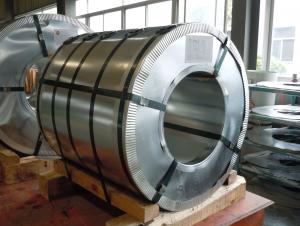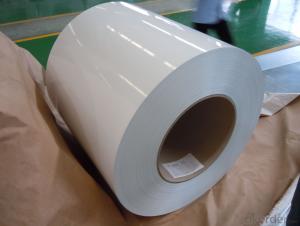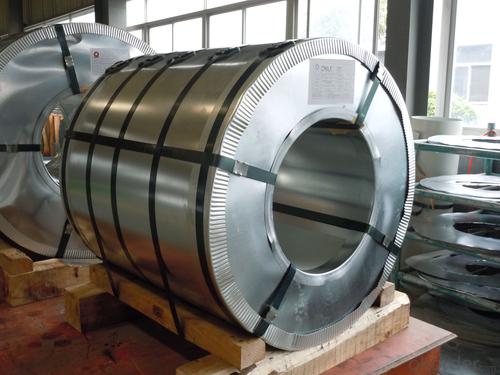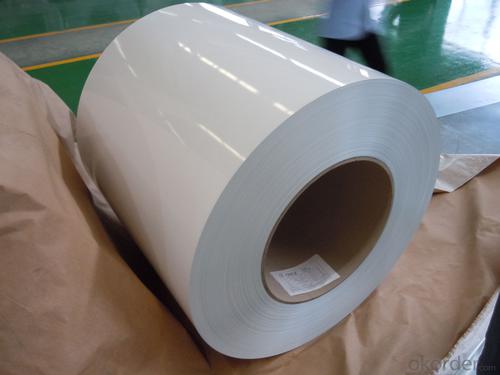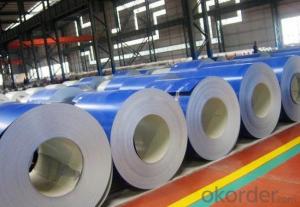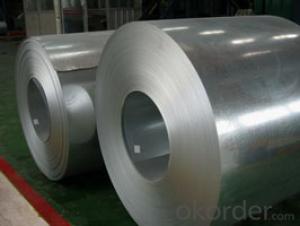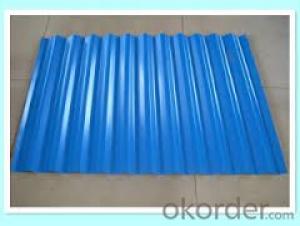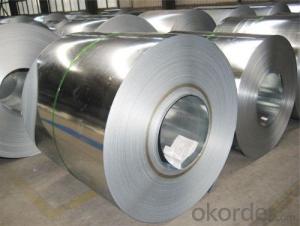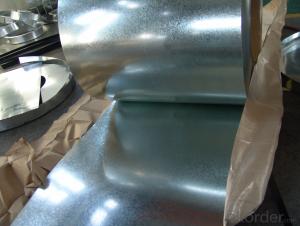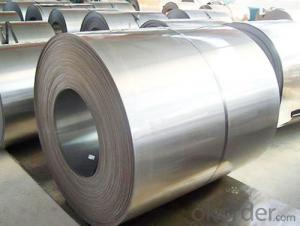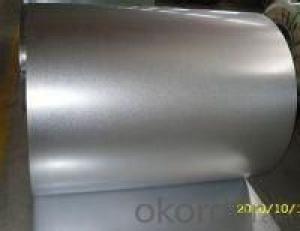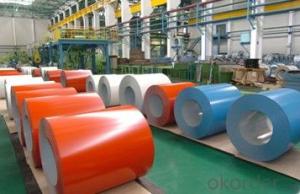High Quality Hot Dipped Galvanized Steel Coils/GI
- Loading Port:
- Shanghai
- Payment Terms:
- TT OR LC
- Min Order Qty:
- 50 m.t.
- Supply Capability:
- 100000 m.t./month
OKorder Service Pledge
OKorder Financial Service
You Might Also Like
Packaging & Delivery
| Packaging Detail: | mill's standard packing,sea worthy packing,steel pallets |
| Delivery Detail: | within 15-30 days after received the deposit or the LC at sight |
Specifications
hot dipped galvanized steel coils
1.FOB:650-1000SUSD/TON
2.size:0.13-0.6mm*750-1250mm*C
3.zinc coating:50-220gsm
4.chromate
hot dipped galvanized steel coils
NAME
| PPGI |
GALVANIZED
|
GALVALUME/ALUZINC
|
CERTIFICATE | ISO9001:2008 | ||
GRADE
| CGCC CGCH CGCD1-CGCD3 CGC340-CGC570 GRADE
| SS GRADE33-80 SGCC SGCH SGCD1-SGCD3 SGC340-SGC570 SGCC DX51D | GRADE33-80 SGLCC SGLCD SGLCDD SGLC400-SGLC570 SZACC SZACH SZAC340R |
MODEL NO | 0.16MM-0.8MM*1250MM OR UNDER | (0.127-1.2*1250MM OR UNDER | 0.12MM-2MM*1250MM OR UNDER |
TYPE
|
Steel coil Steel sheets/plates Corrugated steel sheets/plates
| Steel coil Steel sheets/plates Corrugated steel sheets/plates |
Steel coil Steel sheets/plates Corrugated steel sheets/plates
|
TECHNIQUE |
Ccold rolled -galvalume /galvanized -PPGI/PPGL | Cold rolled - galvanized |
Cold rolled -galvalume /Aluzinc
|
SURFACE TREATMENT | Mini/regular/big/zero spangle, Chromate treatment /chromate-free treatment /untreated unoile/oiled, TENSION LEVELLERT SKIN PASS anti-fingerprint/un-anti-fingerprint, Coating,color
| Mini/regular/big/zero spangle, Chromate treatment /chromate-free treatment /untreated unoile/oiled, TENSION LEVELLERT SKIN PASS anti-fingerprint/un-anti-fingerprint, Coating
| |
APPLICATION | Structural use ,roofing, commercial use, household appliance, industry, family
| ||
SPECIAL APPLICATION | Wear resistant steel, high- strength - steel plate | ||
- Q: What are the different methods of punching steel coils?
- For punching steel coils, there are several methods available that vary depending on specific requirements and desired outcomes. The following are some commonly used methods: 1. Mechanical Punching: To create holes in the steel coil, a mechanical press is employed. This method involves utilizing a punch and die set, where the coil is subjected to force from the punch to create the hole. Mechanical punching is best suited for small to medium-sized holes and finds frequent use in high-volume production settings. 2. Hydraulic Punching: In hydraulic punching, hydraulic pressure is utilized to drive the punch into the steel coil. This method is commonly employed for punching larger holes or shapes that demand greater force. Hydraulic punching machines offer precise control and can handle thicker and harder materials. 3. Laser Cutting: Laser cutting is a non-contact technique that employs a laser beam to cut through the steel coil. By directing a focused laser beam onto the coil, the material is melted and evaporated to form the desired shape or hole. Laser cutting provides high precision and can be used for complex shapes and patterns. 4. Plasma Cutting: Plasma cutting involves the use of a high-velocity jet of ionized gas (plasma) to melt and remove the steel coil material. This method is suitable for cutting thicker steel coils and is often employed for larger holes or irregular shapes. 5. Waterjet Cutting: Waterjet cutting uses a high-pressure jet of water mixed with abrasive particles to cut through the steel coil. This method is versatile and can effectively cut various materials, including steel. Waterjet cutting is renowned for its high precision and clean cuts. Each method of punching steel coils possesses its own advantages and considerations. Factors such as material thickness, desired precision, production volume, and cost will determine the most suitable method for a specific application.
- Q: I want to know because I'm going to Hershey Park on Wednesday and Steel Force looks about the same size, so, I wanted to know. It's not that Steel Force is too big for me.
- steel force breaks the 200ft mark and is a steel out and back roller coaster. Tidal force is a water ride that is about 100 ft tall. If you can do Steel Force then you should be able to handle anything at Hersheypark. the on;y ride they have bigger is the Kissing Tower
- Q: What are the common coil transportation methods?
- The common coil transportation methods include using flatbed trucks, coil racks, coil cars, and coil trailers.
- Q: What are the common defects found in steel coils?
- Some common defects found in steel coils include surface defects such as scratches, dents, and rust spots. Other defects may include coil breaks, which are cracks or breaks in the steel, as well as wavy edges, uneven thickness, and coil set, which is when the coil has a permanent curvature.
- Q: What are the different types of steel coil slitting methods?
- There are three main types of steel coil slitting methods: rotary slitting, loop slitting, and oscillating slitting. Rotary slitting involves using a circular knife to cut the coil into smaller strips. Loop slitting involves creating a loop in the coil and then cutting it using a straight knife. Oscillating slitting involves using a reciprocating knife to make a back-and-forth motion while cutting the coil. These methods allow for precise and efficient slitting of steel coils into narrower strips.
- Q: steel structure
- Disadvantages Of Steel
- Q: How are steel coils inspected for surface finish variations?
- Steel coils are inspected for surface finish variations using visual examination, mechanical methods such as gauges and calipers, and non-destructive testing techniques like magnetic particle inspection or ultrasonic testing.
- Q: How are steel coils inspected for surface defects?
- Steel coils are inspected for surface defects using various methods such as visual inspection, magnetic particle testing, eddy current testing, and ultrasonic testing. These techniques help identify any imperfections or flaws on the surface of the steel coils, ensuring they meet quality standards before they are further processed or shipped to customers.
- Q: What are the common coil packaging materials?
- The common coil packaging materials include stretch film, shrink wrap, steel strapping, and wooden or cardboard cradles.
- Q: I would like to know the process of making steel from the mining of ore to the final product. Can anybody offer some help? Either where to look, or the process itself. I would like to have included the different options with which to make steel. Through scrap metal, or iron ore briquettes etc... Thanks.
- Adding 6% carbon to molten iron makes steel.
Send your message to us
High Quality Hot Dipped Galvanized Steel Coils/GI
- Loading Port:
- Shanghai
- Payment Terms:
- TT OR LC
- Min Order Qty:
- 50 m.t.
- Supply Capability:
- 100000 m.t./month
OKorder Service Pledge
OKorder Financial Service
Similar products
Hot products
Hot Searches
Related keywords
